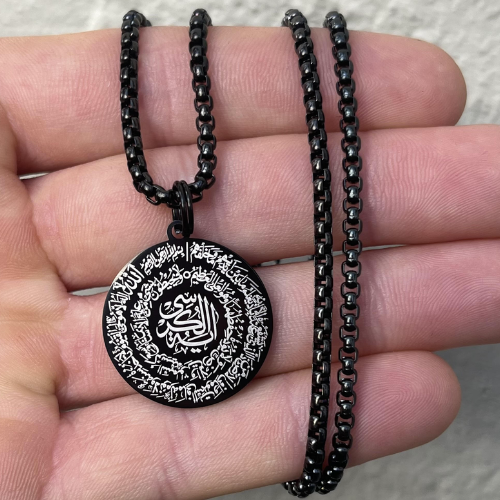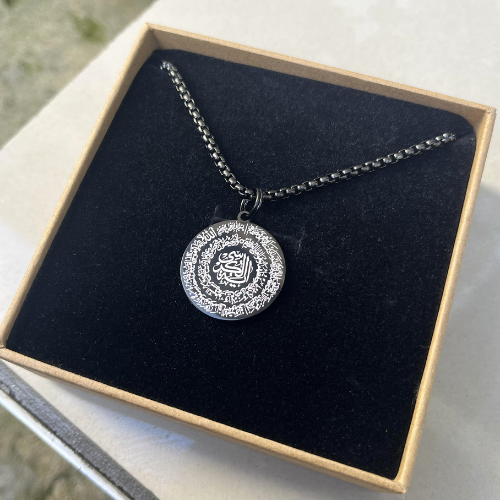Description

Wearing a necklace with Ayat al-Kursi, also known as The Throne Verse from the Quran, is a personal choice for many individuals, often driven by spiritual and cultural beliefs.
Here are four potential benefits that people associate with wearing a necklace featuring Ayat al-Kursi:
- Spiritual and Emotional Comfort:
- Many individuals find comfort and solace in reciting or carrying verses from the Quran. Ayat al-Kursi, being a powerful and profound verse, is believed to provide spiritual strength and emotional reassurance.
- Wearing a necklace with The Throne Verse allows individuals to keep a tangible and symbolic connection to their faith close to their hearts, providing a sense of spiritual grounding and emotional comfort in various situations.
- Protection and Blessings:
- Many believe that reciting this verse and wearing it as a necklace can serve as a means of seeking protection from harm and negative influences.
- Constant Reminder of Faith:
- The necklace serves as a visible and tangible reminder of one’s faith. When worn regularly, it prompts individuals to reflect on the teachings of Ayat al-Kursi and their broader spiritual beliefs.
- This constant reminder can be particularly meaningful in daily life, helping individuals maintain a connection to their faith amid the demands and distractions of the world.
- Symbol of Identity and Belonging:
- Wearing a necklace with Ayat al-Kursi can also be a symbolic expression of one’s Muslim identity and belonging to the Islamic community. It serves as a visible marker of faith and a shared cultural and religious heritage.
- The necklace can be a source of pride and connection for individuals who want to openly express their commitment to Islamic values and teachings.
It’s important to note that the perceived benefits of wearing a The Throne Verse necklace are subjective and can vary among individuals. While some people may find great comfort and meaning in this practice, others may approach their faith and spirituality in different ways.
Here are four important aspects of Muslim worship in South Africa:
- Firstly, Salah (Prayer):
- Salah, or the ritual prayer, is one of the fundamental pillars of Islam. Muslims in South Africa, like Muslims worldwide, perform five daily prayers facing the Kaaba in Mecca. These prayers occur at specific times throughout the day and provide a regular means of connecting with Allah.
- Secondly, Jumu’ah (Friday Prayer):
- Jumu’ah is the congregational Friday prayer that holds special significance in Islam. In South Africa, as in other Muslim communities, Muslims gather at mosques for the Jumu’ah prayer, which includes a sermon (khutbah) delivered by an imam. It is a time for communal worship and spiritual reflection.
- Thirdly, Zakat (Charitable Giving):
- Zakat is one of the Five Pillars of Islam and involves the giving of alms or charity to those in need. Muslims in South Africa, as part of their religious duty, contribute a portion of their wealth to help the less fortunate. This charitable giving is often organized through local mosques or Islamic charities.
- Lastly, Fasting During Ramadan:
- Ramadan is the ninth month of the Islamic lunar calendar, during which Muslims fast from dawn to sunset as an act of worship and self-discipline. In South Africa, the Muslim community observes Ramadan with daily fasting, increased prayers, and engaging in acts of charity. The month culminates in the celebration of Eid al-Fitr, a festive occasion marking the end of Ramadan.
In conclusion, it is important to note that these worship practices are not exhaustive, and individual Muslims may engage in additional forms of worship, such as reading the Quran, engaging in personal prayers (dua), and participating in religious study circles. The diversity within the Muslim community in South Africa, which includes individuals from various ethnic backgrounds and cultural traditions, may also influence the specific ways in which these worship practices are observed.









